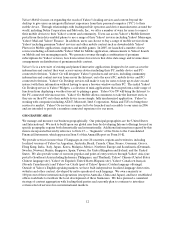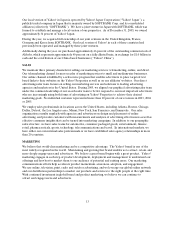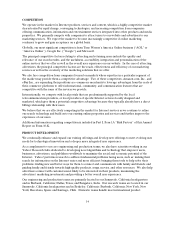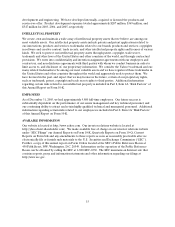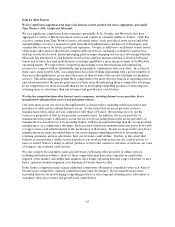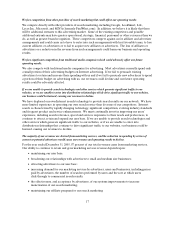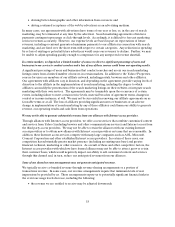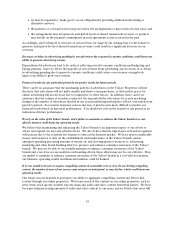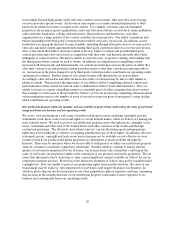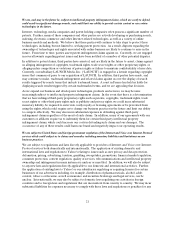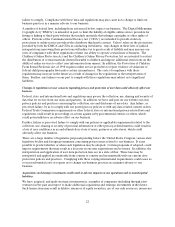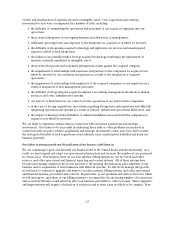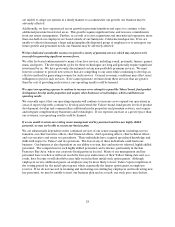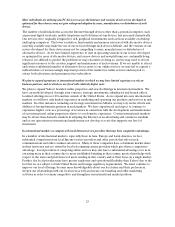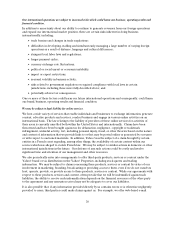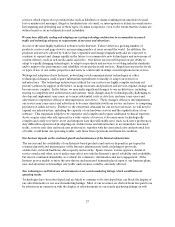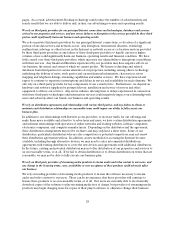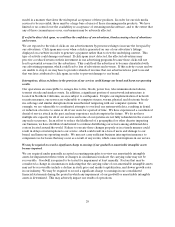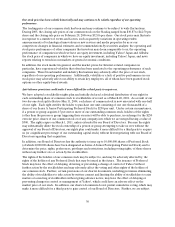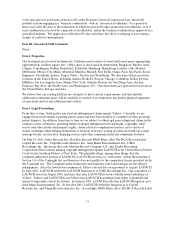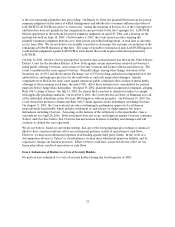Yahoo 2005 Annual Report Download - page 28
Download and view the complete annual report
Please find page 28 of the 2005 Yahoo annual report below. You can navigate through the pages in the report by either clicking on the pages listed below, or by using the keyword search tool below to find specific information within the annual report.22
failure to comply. Compliance with these laws and regulations may also cause us to change or limit our
business practices in a manner adverse to our business.
A number of federal laws, including those referenced below, impact our business. The Digital Millennium
Copyright Act (“DMCA”) is intended, in part, to limit the liability of eligible online service providers for
listing or linking to third-party websites that include materials that infringe copyrights or other rights of
others. Portions of the Communications Decency Act (“CDA”) are intended to provide statutory
protections to online service providers who distribute third party content. Yahoo! relies on the protections
provided by both the DMCA and CDA in conducting its business. Any changes in these laws or judicial
interpretations narrowing their protections will subject us to greater risk of liability and may increase our
costs of compliance with these regulations or limit our ability to operate certain lines of business. The
Children’s Online Protection Act and the Children’s Online Privacy Protection Act are intended to restrict
the distribution of certain materials deemed harmful to children and impose additional restrictions on the
ability of online services to collect user information from minors. In addition, the Protection of Children
From Sexual Predators Act of 1998 requires online service providers to report evidence of violations of
federal child pornography laws under certain circumstances. The costs of compliance with these
regulations may increase in the future as a result of changes in the regulations or the interpretation of
them. Further, any failures on our part to comply with these regulations may subject us to significant
liabilities.
Changes in regulations or user concerns regarding privacy and protection of user data could adversely affect our
business.
Federal, state and international laws and regulations may govern the collection, use, sharing and security of
data that we receive from our users and partners. In addition, we have and post on our website our own
privacy policies and practices concerning the collection, use and disclosure of user data. Any failure, or
perceived failure, by us to comply with our posted privacy policies or with any data-related consent orders,
Federal Trade Commission requirements or other federal, state or international privacy-related laws and
regulations could result in proceedings or actions against us by governmental entities or others, which
could potentially have an adverse effect on our business.
Further, failure or perceived failure to comply with our policies or applicable requirements related to the
collection, use, sharing or security of personal information or other privacy-related matters could result in
a loss of user confidence in us and ultimately in a loss of users, partners or advertisers, which could
adversely affect our business.
There are a large number of legislative proposals pending before the United States Congress, various state
legislative bodies and foreign governments concerning privacy issues related to our business. It is not
possible to predict whether or when such legislation may be adopted. Certain proposals, if adopted, could
impose requirements that may result in a decrease in our user registrations and revenues. In addition, the
interpretation and application of user data protection laws are in a state of flux. These laws may be
interpreted and applied inconsistently from country to country and inconsistently with our current data
protection policies and practices. Complying with these varying international requirements could cause us
to incur substantial costs or require us to change our business practices in a manner adverse to our
business.
Acquisitions and strategic investments could result in adverse impacts on our operations and in unanticipated
liabilities.
We have acquired, and made strategic investments in, a number of companies (including through joint
ventures) in the past and expect to make additional acquisitions and strategic investments in the future.
Such transactions may result in dilutive issuances of equity securities, use of our cash resources, incurrence


